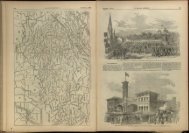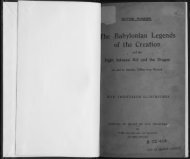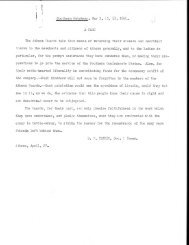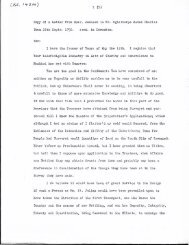THE SHE KING; OR, THE BOOK OF ANCIENT POETRY
THE SHE KING; OR, THE BOOK OF ANCIENT POETRY
THE SHE KING; OR, THE BOOK OF ANCIENT POETRY
Create successful ePaper yourself
Turn your PDF publications into a flip-book with our unique Google optimized e-Paper software.
152 <strong>THE</strong> <strong>BOOK</strong> OP POETEY. [PART I. BK X. X.] <strong>THE</strong> <strong>BOOK</strong> OP POETEY. 153<br />
This piece is referred, we may presume correctly, to some time after<br />
duke Ch'aou, when, for more than fifty years, a struggle went on between<br />
the ambitious chiefs of K'euh-yuh, and the marquises proper of Tsin.<br />
The people were in the main loyal to Tsin, and one king and another sent<br />
expeditions to support them. There was of course great trouble and<br />
confusion in the State, and the work of agriculture was much interfered<br />
with.<br />
1 The wild geese fly the bushy oaks around,<br />
With clamour loud. Suh-suh their wings resound,<br />
As for their feet poor resting-place is found.<br />
The king's affairs admit of no delay ;<br />
Our millets still unsown, we haste away.<br />
No food is left our parents to supply ;<br />
When we are gone, on whom can they rely ?<br />
O azure Heaven, that shinest there afar,<br />
When shall our homes receive us from the war ?<br />
2 The wild geese on the bushy jujube trees<br />
Attempt to settle, and are ill at ease;—<br />
Suh-suh their wings go flapping in the breeze.<br />
The king's affairs admit of no delay;<br />
Our millets still unsown, we haste away.<br />
How shall our parents their requirements get ? '<br />
How in our absence shall their wants be met ?<br />
O azure Heaven, that shinest there afar,<br />
When shall our homes receive us from the war ?<br />
8 The bushy mulberry trees the geese in rows<br />
Seek eager, and to rest around them close,—<br />
With rustling loud, as disappointment grows.<br />
The king's affairs admit of no delay;<br />
To plant our rice and maize we cannot stay.<br />
How shall our parents find their wonted food ?<br />
When we are gone, who will to them be good ?<br />
O azure Heaven, that shinest there afar,<br />
When shall our homes receive us from the war ?<br />
IX.<br />
The Woo e ; narrative. A BEQUEST TO <strong>THE</strong> <strong>KING</strong>'S ENVOY FOB <strong>THE</strong><br />
ACKNOWLEDGMENT OP DUKE WOO AS MAEQUIS OP<br />
In B.C. 678 the struggle between the branches of the House of Tsin<br />
was brought to a close, and Chihg, earl of K'euh-yuh, called after his<br />
death duke Woo, made himself master of the whole State. It was an<br />
act of spoliation, but the usurper bribed the reigning king He, and got<br />
himself acknowledged as marquis of Tsin. In this piece \ve must sup<br />
pose that application is made by one of his officers to an envoy from the<br />
capital for the royal confirmation.<br />
The different ranks in ancient China were marked by the number of<br />
carriages, robes, &c., conferred by the king. The prince of a great State<br />
had seven of the ten royal symbolic figures on his robes. Those had pre-<br />
, viously belonged to the marquises of Tsin, and Woo might have assumed<br />
' them at once, but he wished to have the king's sanction in doing so. The<br />
prince of a State, when serving at court as a minister of the crown, was<br />
held to be of lower rank by one degree; hence the seven symbols of<br />
stanza 1 appear in 2 as only 6.<br />
1 State robes can he be said to want ?<br />
His robes the seven high symbols show.<br />
But let him have them by your grant:—<br />
That peace and fortune will bestow.<br />
2 State robes can he be said to want ?<br />
The symbols six his robes display.<br />
But let him have them by your grant,<br />
And that will lasting peace convey.<br />
X.<br />
The Tern teclie, too; metaphorical. SOME ONE REGRETS <strong>THE</strong> POVERTY<br />
OP HIS CIRCUMSTANCES, WHICH PREVENTED HIM FROM GA<strong>THE</strong>RING<br />
ABOUND HIM COMPANIONS WHOM HE ADMIRED.<br />
1 On the left of the way, a i-usset pear tree<br />
Stands there all alone,—a fit image of me.<br />
There is that princely man ! 0 that he would come,<br />
And in my poor dwelling with me be at home !<br />
In the core of my heart do I love him, but say,<br />
Whence shall I procure him the wants of the day.<br />
2 At the bend in the way a russet pear tree<br />
Stands there all alone,—a fit image of me.<br />
There is that princely man ! 0 that he would come,<br />
And rambling with me be himself here at home !<br />
In the core of my heart I love him, but say,<br />
Whence shall I procure him the wants of the day.








